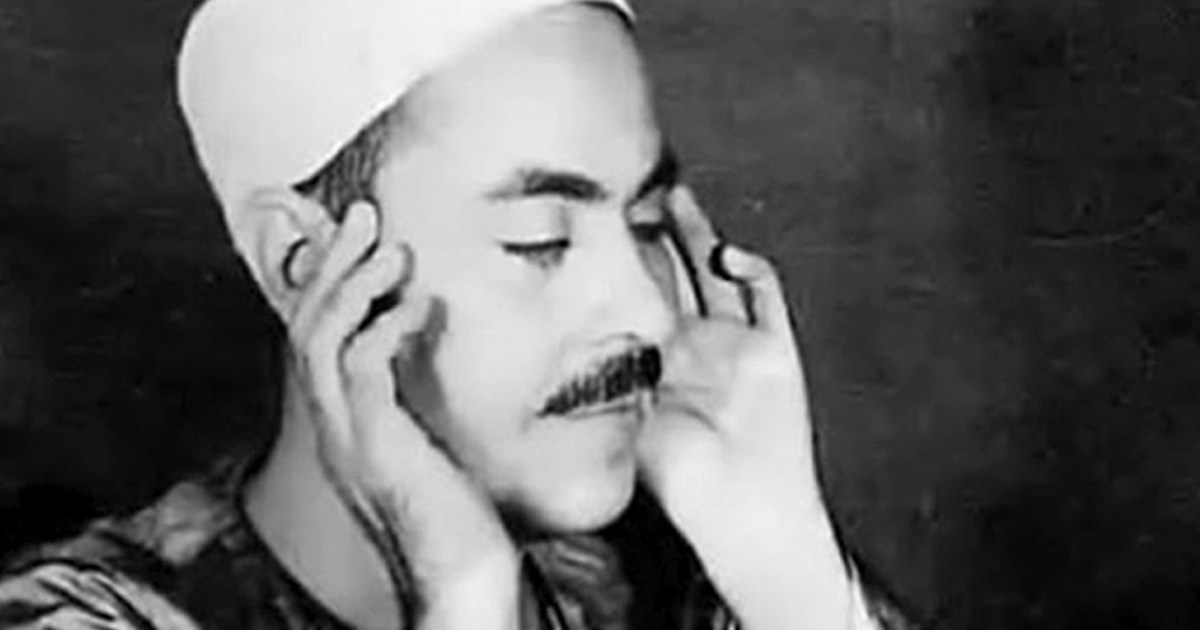Few are the reciters of the Noble Qur’an with whom some of the characteristics of the late Sheikh Muhammad Rif’at were gathered.
Patience, satisfaction, self-discipline, contentment, certainty, strength, strength and solidity.
His fans are a wide audience that extends from the end of the nineteenth century until today. The Muslim, Coptic, and even the Jew in Egypt, who was born in one of the popular neighborhoods in its capital, Cairo.
Sheikh Rifaat wrote during the 68 years of his life a fragrant biography that is always renewed and intensified by hearing his recitations, which were recorded with primitive tools at the time, and most of them were lost and did not reach us completely.
Within the series "Sounds from Heaven", a film produced by "Al-Jazeera Documentary" presents aspects of the sheikh’s life, testimonies of those who contemplated him and piety, and the testimonies of his grandchildren. The episode also reveals some of the most prominent features of the late Sheikh’s biography.
The late musician Mohamed Abdel-Wahhab says, in an interview with him about his memories with Sheikh Muhammad Refaat, "I was a friend of him and under his feet, as my relationship with him changed from friend to servant."
"I felt that he was really addressing God, his recitation was not just a reading, and I felt that he was in the hands of God before he read the verse, because faith is mixed with his voice and his voice mixed with faith," Abdel-Wahab continues.
Regarding the relationship between the two, Ibrahim Rifaat, the grandson of the sheikh, recounts that Muhammad Abd al-Wahhab spoke to the late poet Kamal al-Shennawi about the voice of Sheikh Muhammad Rifaat, so the second asked him to accompany him to listen to him in the “Fadel Pasha” mosque in the Sayyida Zainab neighborhood, where he used to recite there every Friday.
Al-Shenawi said to Abdel-Wahhab, "I will come half an hour before the prayer to listen to him, so Abdul-Wahhab said to him, if you want, then let it be at seven in the morning, because people flock to the mosque early to find a place for her to listen to the sheikh."
Not far from the opinion of the late Abd al-Wahhab, the Iraqi oud player Naseer Shamma says that the voice of Sheikh Muhammad Rifaat was so strong that he could reach more than three thousand people through him in open spaces.
Shamma stops in his talk about Muhammad Rifaat about the conditions of the sheikh’s upbringing, the historical context in his life and the people present in that era. He says, “The emergence of the creator plays a big role in his life,” indicating that the late Sheikh was surrounded by great peaks in the field of thought, literature and art, and that his coming in This timing completed that circuit.
As for the sensory disability that afflicted Sheikh Muhammad Rifat and made him lose his sight at the age of two, Nasir Shamma says, "Those who are deprived of the blessing of sight possess a fairy imagination." , And this means that you see with your own insight.
Coptic and Jewish fans, and
from artistic opinion to another talk about another feature in the biography of Sheikh Muhammad Rifat, the late Egyptian journalist Louis Grace says that the sheikh witnessed important national events, including the period of leader Mustafa Kamel, the Dinshaway incident and the 1919 revolution.
Apart from religious sensitivities, Louis Grace did not hesitate to say, "When I came to Cairo, I found a large number of Copts walking behind Sheikh Muhammad Rifaat in every marquee he sang in."
Grace says that through his recitation, Sheikh Muhammad Rifaat "played a very important national role more than the speeches of politicians or singers' songs did, and brought the Copt closer to the Muslim than did the speeches of politicians, because his voice is very affectionate and makes you a gentle person who loves those in front of you."
Regarding this meaning also, the grandson Ibrahim Refaat says, "At the time of the sheikh, many homes used to hold a seminar or session in which Sheikh Muhammad Rifaat would read, and people of different religions attended it, such as the late actor Najeeb al-Rihani, who is a Christian, and the singer Laila Murad, who is Jewish (she later entered Islam) ".
The meanings of acceptance, tenderness, and tenderness attracted the attention of the late Sheikh Rifaat, who says that Sheikh Rifaat used to read and his eyes overflowed with tears in an effective way in those who listened to him. She also points out that whoever sees Sheikh Rifaat for the first time does not realize that he is blind.
A cruel world and a quiet departure.
His granddaughter, Hana Rifaat, explains in her grandfather's voice, "The world was cruel with Sheikh Muhammad Rifat, who was born in the Maghreblin neighborhood in Cairo on May 9, 1882, and this is the secret of sadness in his voice."
The granddaughter says that the first recording of Sheikh Muhammad Rifaat was broadcast on May 31, 1934, at the opening of the Egyptian government's wireless radio, and that the one who nominated him for reading on the radio was Muhammad Ali, the cousin of King Farouk.
Regarding the Fadel Pasha Mosque in the Sayyida Zeinab neighborhood, in which the sheikh used to recite, his granddaughter says that he was witnessing a great crowd, so that the train whose tape passes in front of the mosque was forced to stop, especially since the Coptic train driver was also a fan of Sheikh Muhammad Rifaat.
In 1943, Sheikh Muhammad Rifaat's larynx was hit by a "hiccup" or "hiccup" that he cut off his recitation, and he stopped reading.
This caused a lump in his throat, which kept him in bed until he died on May 9, 1950.
-
( Al
Jazeera Documentary)

